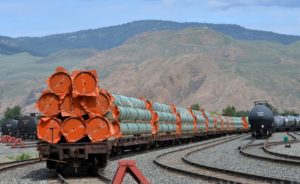
On Thursday, August 30, 2018 the Canadian Federal Court of Appeal did the unthinkable. Its Judgement in Tsleil-Waututh Nation v. Canada (Attorney General), 2018 FCA 153 (CanLII) quashed approval of the $9.3-billion (CAN) Trans Mountain oil pipeline. The Canadian government announced last spring that it would purchase the Trans Mountain pipeline from Kinder Morgan Ltd. for $4.5-billion to guarantee that the oilsands pipeline expansion would be built in the national interest. Ironically, Kinder Morgan shareholders approved the sale (which was not conditional on the Court decision) at a 3-minute meeting the same day that the Judgement was released.
Why did the Court block this mega-project declared by the Canadian Prime Minister to be in the national interest? Two reasons: the federal government’s failure to consult in a meaningful way with affected First Nations; and the National Energy Board’s failure to consider the environmental impact of marine shipping related to the project. The Court indicated that these two issues had to be addressed as part of any re-do.
“What’s this got to do with mediation?”, you ask. “Why wasn’t this dispute mediated?”, I respond.
Why, as the case proceeded in the Courts, was there not a well-funded parallel mediation process to allow the affected parties to see if they could negotiate a mutually acceptable resolution?
Oh, I’m sure there were some negotiations along the way. There may even have been some attempts at facilitation, although I can’t find any reference to that in my search of media reports.
Mediation makes some pretty bold claims for itself: the ability to resolve disputes in a way that is less costly, less time-consuming and more satisfying that adjudicative processes. If that’s so then why is it so rarely used on the “big” disputes like this?
This question was addressed in 1996 by Robert A. Baruch Bush, in his paper, “What Do We Need a Mediator For?”: Mediation’s Value-Added for Negotiators, Ohio State Journal on Dispute Resolution [Vol 12:1 1996].
It’s well worth a read!
Interestingly the scenario Professor Bush chose for his analysis was also a multi-party land use issue involving several parties with a legal threat of blocking a proposed project.
In his paper he also pointed out that the real comparison should not be between litigation on the one hand and mediation on the other. Rather, with the vast majority of cases settling before a litigated outcome, the comparison should be between mediation and unassisted negotiation.
With detailed reference to the available research he observed,
“Together, strategic and cognitive barriers help explain why reaching negotiated agreement is difficult, no matter how skillful the negotiators. Impasses and sub-optimal bargains result because of decisions that are made with inadequate and unreliable information, which is further distorted through biased interpretive processes. And the strategic incentives and cognitive biases responsible for these informational barriers are very difficult for the parties themselves to change or transcend.” p. 21
He goes on to consider the specific things that mediators do to overcome these strategic and cognitive barriers:
-
-
-
- facilitate information flow and communication
- help negotiators understand the interests and predicaments of the other side
- foster each negotiator’s creativity
- reduce negotiator’s vulnerability to perceptions of weakness
- blunt conflict escalation
-
-
He gives a quote from the hypothetical mediator being considered in his example when asked the question posed in the title of the paper, “What do we need a mediator for?”. It’s worth setting out in full for those of you who won’t have time to read the full paper.
“You ask what a mediator would add to your negotiation process. Fair question. The answer is that she can help you understand your situation- and your options and each other-better and more fully than you do now, and better than you will if you continue working on your own. I say this because research and experience has shown that gathering reliable information and analyzing it accurately is much easier when parties are working with a mediator than when they are working alone. And if you understand the situation, options and each other more completely and accurately, you will be able to make better decisions on what you want to do-to see if there is a deal that can be made; if there is one, to see how to move towards making it; and if not, to see what your other options are. All this would be easier to see because of the increased clarity that a mediator can help you attain about the situation and each other. The bottom line: a mediator’s assistance will help you make the best possible decisions for yourselves-which means a better chance of reaching settlement and on better terms.” p. 14
With the fate of the Trans Mountain pipeline now in legal limbo and the resultant loss of the much-needed economic stimulation it would have provided isn’t it reasonable to ask, “why wasn’t mediation used in this case?”
In Canada we’ve witnessed the growth of “mandatory mediation” in many areas. Is it time to consider a requirement of mandatory mediation for major public policy disputes?
With dark clouds forming over the political future of the Premier of the province of Alberta and the Prime Minister of Canada, both facing elections within the next year, policy makers might well give careful consideration to these questions.
________________________
To make sure you do not miss out on regular updates from the Kluwer Mediation Blog, please subscribe here.



Brilliant Rick. Thanks for this. We ask the same question here in the UK about Brexit. There are examples of big disputes being mediated around the world, I am sure. Perhaps these could be gathered together by Kluwer?
Great example of where we continue to face a disconnect between what those of us in the mediation community know to be possible and those that continue to manage conflict in the dark.